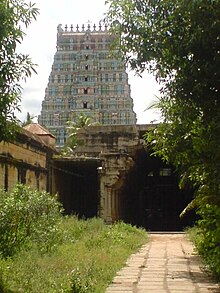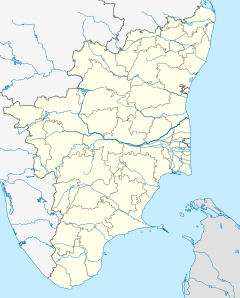Kalayar Kovil
| Kalayar Kovil | |
|---|---|
Kaleeswarar Temple | |
 | |
| Religion | |
| Affiliation | Hinduism |
| District | Sivaganga |
| Deity | Kaleeswarar (Shiva) |
| Location | |
| State | Tamil Nadu |
| Country | India |
 Location in Tamil Nadu | |
| Geographic coordinates | 9°50′51″N 78°37′41″E / 9.84750°N 78.62806°E |
| Architecture | |
| Type | Tamil architecture |
| Part of a series on |
| Hinduism |
|---|
 |
|
|
Kalaiyar Kovil is a historic temple in Sivaganga District, Tamil Nadu, India.
Location[]
The temple is in Sivaganga District, 18 km (11 mi) east of Sivagangai.
Name of temple[]
Kalaiyar Kovil derived its name from the Kaleeswarar temple of the place. Kalaiyar is a corruption of the word Kaleeswaran. During the Sangam period, this place was known as Kaanapair as can be seen from the 21st verse in the purananooru sung by Iyur moolakizhar, a poet of the Sangam period. In the 9th Century A.D. Saint Sundara moorthy nayanar described the presiding deity in his devotional songs as Kaalai. Since then the deity was known as Kalaiyar, with the Tamil sufix yar added to it denoting respect. The temple came to be known as Kalaiyar Kovil and this was later adapted to the place also. It is one of the shrines of the 275 Paadal Petra Sthalams.
Temple structure[]
A lofty Rajagopuram (150 feet) and an imposing Teppakkulam tank (with a mandapam) named Aanai madu adorn this shrine. Airavatam the elephant of Indra is said to have created this tank. There are three shrines in this temple associated with the three functions of creation, preservation and completion. The presiding deity Lord shiva is called as Kaaleeshwarar, Someshwarar, Sundareshwarar and the Ambal his consort mother Parvati is called as Swarnambikai, Soundara Nayaki, Meenakshi. Additional to that there are 3 separate shrines for both the male and female deities of famous Shiva temples in a mandapam outside the shrine.
Seat of kings[]
Kalaiyarkoil was the seat of the kings from very early days. King Vengai Marban ruled over this area during Sangam period. It was the stronghold of rulers of Sivangangai. It was also the seat of the freedom fighters like Muthu Vatuka Natha Thevar and Maruthu brothers.
Legend[]
KaliDevi fought against chandasuran at kalayarkovil. She prayed the kaleeswarar lingam and joined hands with saptha mathargal and won the battle. That is why the place is named as kalipuram.
History[]
On 25 June 1772, the Company forces under Col. Joseph Smitt and Cap. Bonjour marched towards Kalayar Kovil. The second king of Sivaganga, Muthu Vaduga Natha Thevar (1750–1772) and Maruthu brothers defended it. Rajah Muthu Vaduganatha Thevar in anticipation of the English invasion made preparation for defence. But Rajah Muthu Vaduganatha Thevar with the many of his soldiers fell dead in the kalaiyarkoil battle. The invading English forces plundered Kalaiyarkoil and collected jewels worth 50,000 pagodas. Kalaiyarkoil temple belongs to Sivagangai Devasthanam.
The temple was kept locked and prayers stopped for some time. it was later re opened and substantial repairs and development were done by Devakottai Zamindar. In fact Shree AL.AR.RM.Arunachalam Chettiar, Zamindar of Devakottai took up sanyas from Koviloor and moved to the at kalayar kovil. He was known as Shreelashree Jamindar Arunachala Gnana Desiga Swamigal and his samadhi is in the rear of the madam. Shree Zamindar swamigal, Senior heir of Devakottai Zamindar Shri AL.AR.Ramasamy Chettiar, Shri AL.AR.RM.Arunachalam Chettiar the then Zamindar of Devakottai in succession had started Devakottai Zamindar Kattalai Endowment after the demise of his father Devakottai Zamindar AL.AR Ramasamy Chettiar (now known as AL.AR.Trust) with a Registered agreement to Sivagangai Devasthanam to conduct special daily, monthly poojas to God Sorna Kaleeswarar and deity Sornavalli Amman.This is performed continuously by his eldest son AL AR Kalairaja Chettiar.
Festivals[]
Kaaleesar's festival is celebrated in the month of Thai where the car festival is observed during the Poosam. Someswarar's Bhrammotsavam is celebrated in the Tamil month of Vaikasi. the float festival also happens then. is celebrated for .[clarification needed]
See also[]
- Maruthu Pandiyar, Madurai district
- Sivaganga
- Hindu temple
- Devakottai
Map routes[]
References[]
This article includes a list of references, related reading or external links, but its sources remain unclear because it lacks inline citations. (September 2011) |
External links[]
- https://web.archive.org/web/20090525164047/http://www.shivatemples.com/pnaadu/pn10.html
- http://www.templenet.com/Tamilnadu/s091.html
- http://www.kalaiyarkovil.com
- Kalaiyar Kovil Kaleeswarar Temple at Kalayarkovil, Sivaganga District – one of the famous 14 Lord Shiva Temples in Pandiya Kingdom – Visit, Travel Guide
- Hindu temples in Sivaganga district
- Tourist attractions in Madurai
- Padal Petra Stalam
- Cities and towns in Sivaganga district

